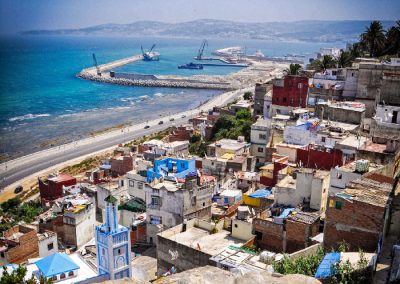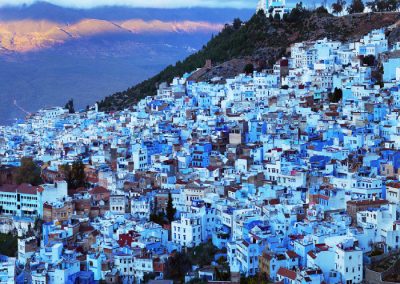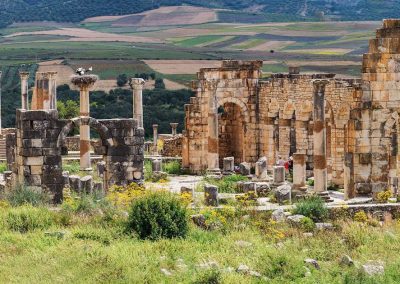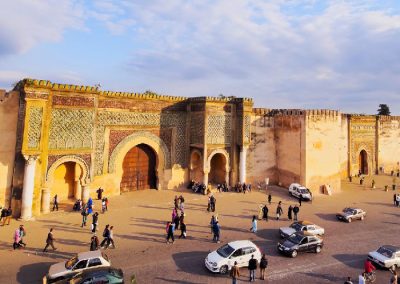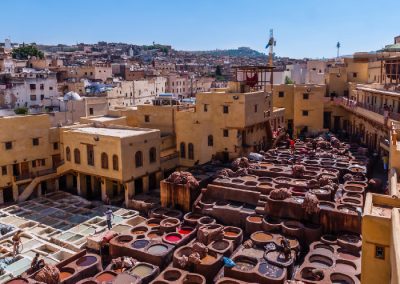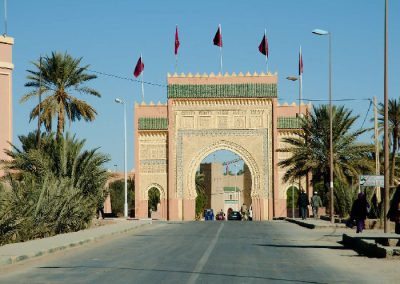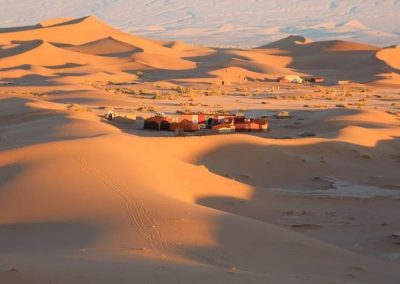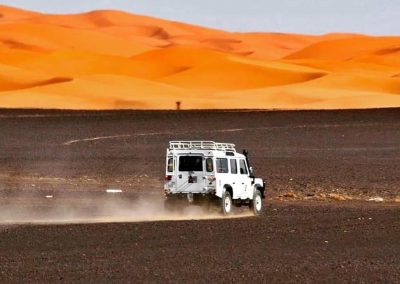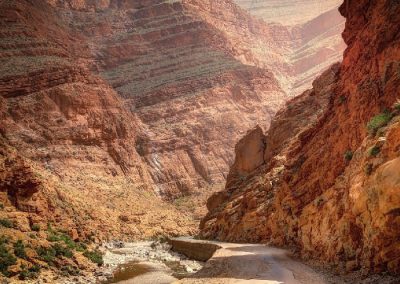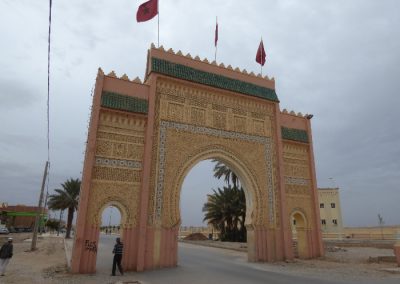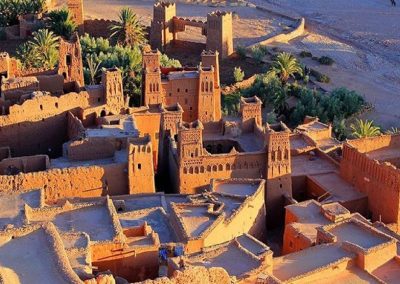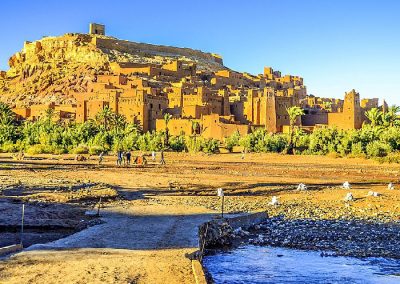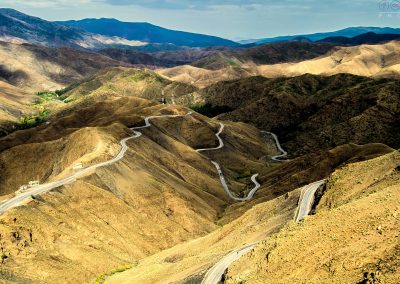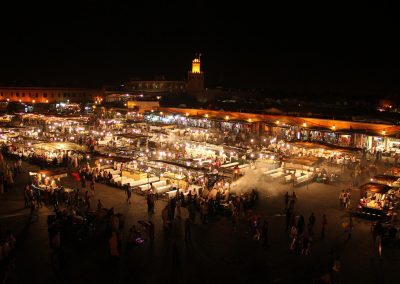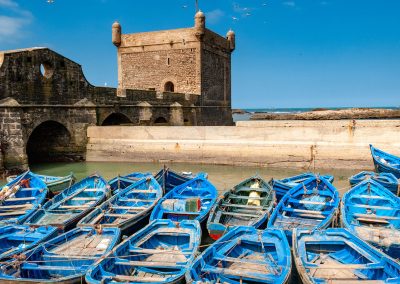Grand tour of Morocco: North to South – 10 Days
Highlights
- Travel to the Moroccan imperial cities
- Excursion to the Blue city Chefchouen
- Explore the must-see of Fes
- Visit the UNESCO site Volubilis
- Walk in Dades Gorges
- Guided tour to the must-see of Marrakech
- Discover the fortified Kasbah of Ait Ben Haddou
- Camel Trekking in Morocco
- Explore the desert & Enjoy the desert activities
- Visit the Filming studios of Ouarzazate
- Excursion to Essaouira
Itinerary for the grand tour of Morocco:
Day 1: Tangier and the “Blue City” of Chefchaouen
For the first day Grand tour of Morocco, you will explore Tangier, which is the portal city that connects Europe to Africa. You can choose to wander around the narrow streets of the old medina, enjoy a café at the Zoco Chico square or simply have a relaxing walk. Then we will move on to our next destination, which is the blue town of Chefchaouen. On our way there, we will make a stop at the Akchour waterfalls in order to explore the landscapes of the beautiful Rif Mountains. After that, we will finally reach Chefchaouen, which is a quiet town that attracts people from all around the world for its lovely and hospitable locals, its iconic blue-colored houses and buildings, and its historical old Medina. We will make sure you’ll get to explore all of the most important locations and attractions that Chefchaouen has to offer, including the main square called Outa El-Hammam, the narrow alleyways of the old medina, the small shops and vendors of artisanal handmade products, and the old fortified Kasbah with its garden, its museum, and its ancient prison cells. Finally, as the day nears its end, we will hike up to the Spanish Mosque in order to catch a panoramic view of the sunset over the entire city and the neighboring mountains as well.
Day 2: Roman Ruins of Volubilis and the imperial cities of Meknes and Fes
If you’re looking to have a moment of quietness to freely explore Chefchaouen and take some amazing pictures of its empty streets, we suggest that you wake up early because tourists don’t usually fill the streets until the afternoon. We will then start driving towards the city of Fez, and on our way there we will make a stop at Volubilis. Volubilis is a city rich in ruins left behind by the great Roman Empire that dates as far back as the year 1 AD. This site is considered a UNESCO world heritage site for its well-preserved ruins that you will explore today, including remains of public buildings, private houses, temples, and intricate works of mosaic.
Our second stop on our grand tour of Morocco will be one of the most important imperial cities of the kingdom: the city of Meknes. Meknes is where we will have lunch, after which we will explore what this beautiful city has to offer. The two most interesting areas of Meknes are the imperial city and the old medina. Meknes and Fez actually share a lot of similarities in this regard, except that Meknes is smaller with way fewer visitors, and most importantly: its vendors are not as insistent as those in Fez. During our tour of the imperial city part of Meknes, we will visit the iconic Bab El Mansour gate, the Mausoleum of Moulay Ismail, the Royal Stables, and more. As for the Old Medina, we will explore its narrow streets and small souk markets, the Madersa El Bouinania (1358), and last but not least, the Dar Jamai Museum (1882).
As we get closer to the city of Fez, we will meet the ruins of the Merenid tombs. This location is famous for its historical value, as well as for being a perfect spot to get a panoramic view over the Old medina. Finally, you will have dinner and spend the night at a traditional Riad in Fez.
Day 3: Fes: Exploring the Imperial City and medieval Medina
The city of Fez is considered a protected UNESCO world heritage site, for it still preserves its authenticity from the impact of French colonization. The Old Fez (Fez El Bali), on which our tour will be focusing, still looks almost identical to what it looked like originally. However, Fez today has expanded and so it contains two more main areas: The new Fez (Fez El Jdid) which was constructed during the Marinid rule as an extension to the Old Fez; and finally the “Ville Nouvelle” part which was constructed by the French during the time of the colonization.
We will start our tour of the city by exploring the Old Medina through a guided tour lasting half a day. Simultaneously, you will get to learn more about what made Fez the way it is today, which is the diversity of the cultures and people that lived here. This goes back to the time of the reign of Moulay Idriss II, who accepted refugees from Spain and Tunisia into his capital Fez. This was in fact beneficial for the city since their skills and knowledge (mostly in architecture and craftsmanship) helped it expand and grow over the years into the Fez we know today.
As a starting point, we will go through the Bab Boujeloud gate traversing the main connecting way of Talaa Kebira. Both sides of the street are filled with colorful shops and boutiques. As we keep progressing inside the old Medina, the streets will get narrower and windier; and unlike Marrakech, the streets of Fez are much steeper. In the middle of the Old Medina, you will get a panoramic view over the colorful Chouara leather tanneries, in which the traditional techniques of leather making (the full process) have not changed over the years.
The next thing you will get to visit during our trip to Fez is the world-famous Al-Qarawiyyin University. This university is the oldest in the world, and it is a marvelous work of Islamic architecture. Some other nearby places also worth visiting are the dormitories called Medersa El Bouinania and also the Attarine Medersa. We end our day of this grand tour of Morocco at our riad.
Day 4: Over the Middle Atlas and into the desert: Erfoud, Merzouga, and the Sahara
On the fourth day of the grand tour of Morocco, you will drive toward the desert at Merzouga, driving through the Col Du Zad pass, which is a mountain pass that’s as high as 2178 meters. We will reach the cedar forests in the Middle Atlas region, in which you will get to watch wild macaque monkeys in their natural habitat. Then we will stop by the town of Midelt to have lunch while enjoying the views of the Moulouya River. Back on the road, we will drive through another high mountain pass called Tizin Talremt, leading us to the breathtaking Ziz Valley. This valley is famous for its impressive groves of palm trees and beautiful greenery. On our way to Erfoud, we will meet an abundance of old Kasbahs which are fortified buildings used in the past to preserve various precious belongings.
We will arrive at Erfoud, also known as the capital of fossils, where we will pay a visit to one of the local fossil workshops so that you can see how the process works. After this we will continue our grand tour of Morocco by driving until we reach the Sahara desert, arriving at the very famous sea of dunes of Erg Chebbi. This erg covers an area of 35 square kilometers, where endless dunes are constantly changing and forming according to the movement of the wind. Finally, we will arrive at our last destination of the day, the town of Merzouga. Here you will find a caravan of camels waiting for you, which you will ride into the Sahara dunes, reaching our desert camp set up specifically for you. You can climb up one of the dunes in order to watch the scenic desert sunset, which we promise you is an opportunity of a lifetime. At the camp, you will have dinner around a warm calming campfire, then spend the night in a traditional nomad-style tent.
Day 5: Adventures around Merzouga, Rissani Market, and Todra Gorge
We strongly advise you to wake up early this next day in order to watch the breathtaking desert sunrise or try out one of the different desert activities available (sandboarding, ATV tour …). We will start our tour today by visiting the neighboring Khamlia village, which is a traditional simplistic desert village known for its catching indigenous Gnaoua music. We will walk around the village for a little bit, before leaving for another desert village called Rissani. Rissani is known for holding the biggest weekly marketplace in the area, where people come from all over the desert to get their provisions. It is an interesting experience to witness.
Our next stop will be the town of Tinghir, special for offering an amazing panoramic view of the nearby villages alongside the river oases and palm groves. Finally, we will arrive at our last destination for today which is the Todra gorges. These are a series of rock formations caused by the Todra River over the years, leaving behind a beautiful trail of cliffs attracting climbers from all around the world. You will get to freely walk around the place to grasp the beauty of its landscapes, enjoying the freshwater of the small river running below.
Contact us for customizing your grand tour of Morocco.
Day 6: Dades Valley, Ouarzazate, and Aït Benhaddou Kasbah
Today we will start driving towards the famous Kasbah of Ait Ben Haddou, through a valley known as the road of The Thousand Kasbahs. We will pass by the Dades valley and the beautiful valley of roses located at Klaat Mgouna, where we will make a quick stop in order to visit a local rose cooperative, for you to learn more about the process of making rose water. After this, we will reach the Hollywood of Morocco: the city of Ouarzazate. Ouarzazate has been given this for being home to the most important movie studios in Morocco, which you can visit during our tour here. Many big international movies were filmed in neighboring regions to Ouarzazate, such as Gladiator, the Mummy, and Lawrence of Arabia. We will tour the local cinema museum to discover more about the history of filmmaking in the area.
After lunch, we will head to the star of the desert: the Kasbah of Ait Ben Haddou. This Kasbah is a recognized UNESCO world heritage site, dating back to the 11th century when it used to play an important role in the trade route connecting merchants from the sub-Sahara with the rest of Morocco. We will check in at the hotel or Riad where we will be staying, after which we will walk around the town near the end of the day after the crowds of tourists would have left. We can also hike up to the old Granary, which is a perfect spot to catch a panoramic sunset view over the entire Kasbah and its surroundings. Also, if you are a fan of the HBO series “Game of Thrones”, you will definitely want to check out the locations in here in which the series was set. Finally, you will have an enjoyable dinner in a spot watching over the valley.
Day 7: Tizi n’Tichka Pass over the High Atlas mountains to Marrakech
We will start our day by leaving the beautiful Ait Ben Haddou behind, and beginning our trip to Marrakech through the High Atlas Mountains, spotting the highest mountain in Morocco on the way: mount Toubkal (4167 meters). Our first stop of the day will be in one of the many Argan oil collectives of the area, in which you will witness the process of making the oil and you will get to try some as well. After leaving the High Atlas climate behind, you will notice how the landscapes will now turn into a flat plain as we finally enter the city of Marrakech.
The first we will do in Marrakech is check in to our hotel so that you rest a little bit from the long road trip. Then you’ll get to spend the rest of your day however you like. For instance, you can wander around one of the many enchanting gardens of the city, or you can explore the beating heart of Marrakech, which is the famous square of Jamaa El Fna. Here you can find all sorts of live arts performed, ranging from traditional music to snake charming. In addition to that, you can try one of the many traditional dishes offered by the food stalls at the square, or by restaurants surrounding it.
Day 8: Marrakech: Exploring the Red City
Continuing our grand tour of Morocco. Marrakech is one of the most important cities in Morocco, also known as the “red city” for its brick red colored walls and buildings. It used to be a massive trading point for merchants and tribes from all over the High Atlas area. You can navigate by yourself through Marrakech’s busy streets, knowing that Jamaa El Fna square alongside the Old Medina is North, the Koutoubia Mosque and its gardens are West, the Saadian tombs and the Bahia and El Badi palaces are South. Finally, the modern part of the city is called Gueliz and in it you can find the beautiful Majorelle Gardens.
If you’re looking for a fun and special way to travel through the Old Medina, you can get a horse-drawn carriage ride (also called a Caleche in french) to get somewhat familiar with the area. You will meet many fondouks along the way, which are traditional guest houses that merchants used for shelter and supplies. For a fresh breather from the heat of Marrakech, you can head to the gardens near the Koutoubia mosque and explore them as well. Make sure to also appreciate the beauty of the architecture of the Koutoubia mosque (which doesn’t allow entrance to non-Muslims).
You will also benefit from a little tour of the Ben Youssef traditional school, where you can explore close up the beautiful artisanal work of Moroccan craftsmanship: from carved wood to Islamic calligraphy, you will explore it all!
Day 9: Essaouira
Today we will leave the beautiful Marrakech to head to the magical city of Essaouira. We will be driving through an extended plain marked by entire forests of the precious Argan tree. Through this forest, you might catch the sight of a goat munching on the fruits from the Argan tree, which happens mostly when the surrounding land doesn’t contain enough grass for the goats. We might also stop at one of the Argan oil cooperatives in the area to observe the oil-making process.
Finally, we will arrive at our destination, Essaouira city. This small and relatively quiet city makes for a nice change from the busy pace of Marrakech. You are free to spend the rest of your day exploring Essaouira however you like. You can have a walk along the seafront rampart called the Skala, lined with some old canons installed by European engineers during the 18th century. Besides that, there’s the old Medina part of the city, which is considered a UNESCO world heritage site, that you really can’t miss visiting. Last but not least, you might want to go to the nearby Diabat village (a short taxi ride away) where Jimi Hendrix allegedly stayed during his time in Morocco.
You may want to check out our grand tour of Morocco from Tangier.
Day 10: Return to Marrakech
For your last moments in Essaouira, you can choose to walk by the beach or do some last-minute souvenir shopping before returning to Marrakech. Once in there, we may make a last visit to the iconic Majorelle garden if we have enough time to do so before ending your grand tour of Morocco. Transfer to the airport.
Desert tours in morocco Inclusions:
- A comfy and private SUV or Van with fuel costs during the journey.
- An English Speaking driver.
- Camel Trekking in Erg Chebbi Dunes.
- Airport Arrivals and Departs.
Desert tours in morocco
Exclusions:
- Lunches, Drinks
- Snacks
- Entrances & flights.

